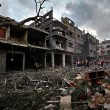Northern Ireland
North: Elections show mass disillusionment with main parties
Northern Ireland: Thousands rally against violent racism
1984 State Papers: Plans for bloody repartition revealed
Haass talks failure – Sectarian politicians cannot find way forward
Parades & protests: Sectarian politicians deliver only conflict
Events of the weekend of 9 August to the 11th shone a spotlight on the sectarian landscape of Northern Ireland in 2013. There was fierce rioting in the city centre of Belfast on the 9th when up to 2000 loyalists mobilised to block an “anti-internment” march organised by a number of dissident republican groups.
HET bias exposed – state incapable of dealing with the past
The Historical Enquiries Team (HET) has been exposed as biased in its “investigation” of crimes carried out by the British Army, RUC and UDR over the course of the Troubles. Two reports have revealed that a softly-softly approach has been taken when questioning soldiers and police officers.
No end in sight to conflict over parades
Fierce rioting took place in several areas of Belfast and Newtownabbey over the 12th weekend. The rioting began when the PSNI enforced a Parades Commission ruling that an Orange Order parade should not be allowed to pass the Ardoyne shops on its return from the main 12th demonstration.
Trade union movement must act against sectarianism
The fall-out from the controversy around the flying of the union flag at Belfast City Hall brought into sharp relief the deep, sectarian divisions which remain a reality of life in Northern Ireland. Tensions were decisively heightened and feelings have been hardened in both communities.
Left wins majority on General Council of North’s largest union
In a highly significant development the Broad Left grouping has won 20 out of 25 seats in recent elections to the General Council of the Northern Ireland Public Sector Alliance (NIPSA), Northern Ireland’s largest union. Nine of the Broad Left’s seats were won by Socialist Party members.
Still no justice for the Ballymurphy 11
The families of the eleven civilians who were shot and killed by the British army in the Ballymurphy Massacre in 1972 continue to campaign for justice. The workers movement has a duty to support their quest and to strive to ensure that the state is exposed for its crimes over the course of the Troubles.















